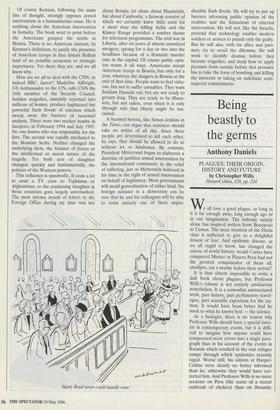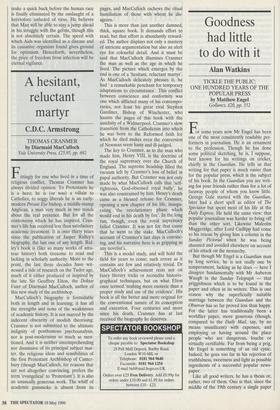Being beastly to the germs
Anthony Daniels
PLAGUES: THEIR ORIGIN, HISTORY AND FUTURE by Christopher Wills HarperCollins, £20, pp. 324 We all love a good plague, so long as it is far enough away, long enough ago or in our imagination. The bubonic variety alone has inspired writers from Boccaccio to Camus. The mere mention of the Ebola virus is sufficient to give us a delightful frisson of fear. And epidemic disease, as we all ought to know, has changed the course of world history: would Cortes have conquered Mexico or Pizarro Peru had not the greatest conquistador of them all, smallpox, cut a swathe before their arrival?
It is thus almost impossible to write a dull book about plagues, but Professor Wills's volume is not entirely satisfactory nonetheless. It is a somewhat unstructured work, part history, part perfunctory travel- ogue, part scientific exposition for the lay- man. It would have been better had he stuck to what he knows best — the science.
As a biologist, there is no reason why Professor Wills should have a special inter- est in contemporary events, but it is diffi- cult to imagine how anyone could have compressed more errors into a single para- graph than in his account of the events in Rwanda which resulted in the vast refugee camps through which epidemics recently raged. Worse still, his editors at Harper- Collins were clearly no better informed than he, otherwise they would have cor- rected him. And Professor Wills is no more accurate on Peru (the scene of a recent outbreak of cholera) than on Rwanda: Fujimori did not succeed the 'inept Belaunde', as he puts it, but the monumen- tally corrupt and incompetent Alan Garcia, whose policies were precisely those of which Professor Wills might have been elsewhere to approve, given his politically correct opinion expressed elsewhere in the book that it is the exploitation of Africa by greedy multinational companies which has helped to spread Aids throughout the conti- nent. Actually, this interpretation of the epidemic will provide succour for those who, like Joshua Nkomo, think the virus was created by whites in order to wipe out blacks. Paranoia, as we know, is seldom a helpful stimulus to sensible policy.
But the main theme of the book is biological rather than political. The author asks why there should be plagues in the first place, and he describes with laudable clarity the interaction between host, pathogen and environment which allows the sudden emergence (and disappear- ance) of deadly diseases. Cholera, for example, was unknown until the second decade of the 19th century, when it made its appearance in Bengal. It required both a biological change in the organism itself and a large human population living near a suitable stretch of water — the delta of the Ganges — for the most dreaded of epi- demic diarrhoeal diseases to develop. It disappeared from Europe with equal sud- denness.
Although Professor Wills rejects the idea that epidemic disease is Nature's way of culling the human population because Nature is blind and has no intentions, the language he applies to micro-organisms and the diseases they cause is often strong- ly and misleadingly teleological. For exam- ple, writing of the malarial parasite, Plasmodium falciparum, and the disease it causes, he asks, 'Why is falciparum malaria trying so hard? What problem or problems is it trying to overcome?' No doubt he writes in this vein partly because our men- tal world is so saturated with intentionality that it is difficult to avoid it in describing the world about us, and partly to make the science more accessible to the layman; but there is a whiff of condescension about it all the same.
There are considerable merits in Profes- sor Wills's book, though. I think every student of history (and every hypochondri- ac) ought to be given the third chapter to read, which is a succinct account of the demographic revolution which has occurred in the last century, such that, for the first time in the whole of human histo- ry, the majority of children who are born (at least in a substantial proportion of the world) will reach old age. This revolution has occurred through the reduction in mor- tality caused by infectious disease, small- pox, cholera, typhoid and tuberculosis among them. And Professor Wills is not the herald of a viral apocalypse, hoping with his book to make a quick buck, before the human race is finally eliminated by the onslaught of a heretofore unheard of virus. He believes that Man will be able to stay a jump ahead in his struggle with the geniis, though this is not absolutely certain. The speed with which Aids was identified as a disease and its causative organism found gives- ground for optimism. Henceforth, nevertheless, the price of freedom from infection will be eternal vigilance.




































































 Previous page
Previous page